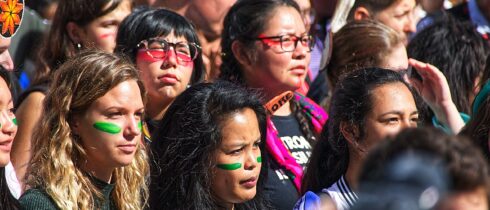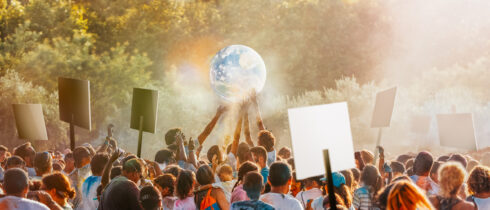

TEDx Talks: How to accelerate solutions to the climate crisis
TEDx Talks: How to champion and accelerate solutions to the climate crisis
Good ideas can reshape the way we see the world and commit us to act. With this conviction, the #ClimateOfChange campaign initiated a TED-talk-style tour across Europe involving scientists, activists, artists and civil society representatives to discuss how to turn ideas into action in the context of a climate and social emergency.
When was the last time you got touched by a great talk? Has a speech ever changed the way you look at a certain topic?
From Greta Thunberg’s ‘how you dare’ speech facing world leaders in the UN Climate Action Summit to David Attenborough’s punchy intervention at the COP26, recent history is rich in examples of landmark talks that push society to open their eyes to the urgency of the climate breakdown.
Science-based facts and figures are essential to raising awareness about the climate and social challenges ahead, but it is words and stories which carry deeper meanings and can influence the way people perceive those facts. Human faces and human stories tend to resonate massively in the collective imagery and people respond with warmth to them.
The #ClimateOfChance campaign was born out of the conviction that only by inspiring and challenging people’s mindsets we can tackle the greatest challenges of our times: a climate crisis rooted in an economic system built on inequality and the myth of endless growth, the forced migration of millions of people caused by the above, and the youth’s hope to reverse this trend and build a fair and sustainable human future.
Changing people’s minds on these complex topics is not an easy task. Together with different experts from all backgrounds, we have launched the ‘Countdown’ TEDx Talk tour, a European journey to discuss how we can encourage society to think differently, moving from ideas to action and creating a real impact on climate justice.
From the reasons that lead to climate inaction, to the flawed approach to climate migration, or why young people held the keys to systemic change. Below you will find a handful of thought-provoking talks that took place on the first leg of the tour, in Brussels, organised by TEDx Ixelles.
Get comfortable in your seat and prepare to question the glasses through which you look at the world.
The 7 dragons of climate inaction
“Our enemy are not people, but are ideas.” It seems like modern culture has tricked us into thinking there are always the good guys versus the bad guys. But that’s not based on reality. Also in the climate crisis, the key is to get everyone working together in the same direction.
Boon Breyne is a climate justice activist at Fridays For Future & Youth For Climate. He passionately pleads that blaming and shaming does not work, because almost all of us face a similar set of psychological effects. So instead, must we not reach out a hand to get others to overcome these barriers?
Changing the discourse on environmental migration
Imagine 2070 if nothing changes for the better: Nearly one-fifth of the world is uninhabitable due to severe environmental stressors. Billions of people, who call this land home, were forced to move. Here’s how, together, we can create “a new story to tell”.
As a young professional, trained in pedagogy, political science and conflict resolution, Natalie aims to advocate for the dignity and rights of the most vulnerable. In her research as well as her project- and fieldwork, she has dedicated special attention to intersectional issues of people affected by climate change, the situation of women and girls, young people and children, and migrants and refugees.
The kids aren’t alright
What does climate change mean for you? Professor Wim Thiery uncovers the intergenerational inequities in exposure to climate extremes in this TEDx talk.
Wim Thiery is a climate scientist with a specific interest in modelling extreme events in a changing climate. Forbes magazine recently elected him as a member of the “Forbes 30 under 30 Europe” Class of 2017, bringing together “the brightest young entrepreneurs, innovators and game-changers in Europe”.
Who is your “we” in global politics?
To whom do global leaders refer when they mention “we” or “our people” while preaching? How can the black, indigenous and people of the colour community belong to that “we” when there is a widespread failure to recognize the political and socio-economic causes of climate-related crises.
Jada Kennedy is a climate activist at Fridays for Future International. Her talk counters the emotional real-life effects of the climate crisis connected to its social issues in our current societal system.
The power of bad habits
Eva Gruber is a Habit Coach and Best-Seller Author. Her talk is about unmasking our mental self-sabotage and establishing good habits. About 6hours of our day are based on mostly unconscious habits, which means this is a game-changer! By training good habits, we can establish supportive behaviour and live healthier relationships with our team, colleagues, and family, and improve peak performance when we are stressed, angry, or insecure.
Which changes matter to us the most?
The way we evaluate change matters but we rarely get to think about it. We pass tests, make statements about what type of future is good for Humanity and leave it at that. But are we assessing skills and hopes, or narrowing ourselves to what seems to be tangible? Are we simply using the future, using change to be right? Thinking in complexity is our only way through to actually understanding the ecosystems around us.
Complexity, decoloniality, dialogue spaces, futures and the law. What’s the link between all of the above? Finding that out is the core of Kwamou’s professional, personal and research work. Since 2014, she facilitates experiments (dialogue spaces) to enable people like you and me to discuss a topic they care about and use their own words instead.
Why young people must believe in a better future
UNICEF honorary representative Ali Mahlodji talks about the principles young people can live, learn and work by that will shine a brighter light on our collective future but especially that of young people.
Ali Mahlodji, born in Iran, is an international entrepreneur, founder of ‘whatchado’, EU Youth Ambassador, keynote speaker, investor, consultant and author.
📢 Your voice also counts, please do not hesitate to sign our #ClimateOfChange petition to the European Commission to demand deep policy changes towards climate justice.














